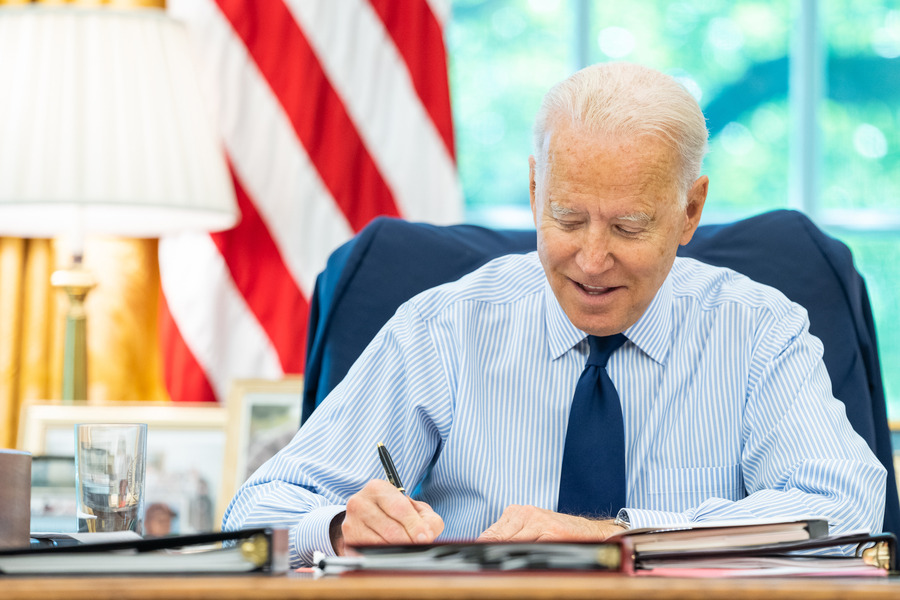A Death at Guantanamo
In other news from Guantanamo, the military has announced the death of one of the detainees:
MIAMI -- Joint Task Force-Guantanamo announced today that a detainee died of apparent natural causes late Tuesday evening. The detainee is identified as Awal Gul, a 48-year-old Afghan. He arrived at Guantanamo in October 2002. Gul was housed in Camp 6, which provides communal living areas for up to 20 detainees. He collapsed in the shower after exercising on an elliptical machine. Other detainees in his cell block then
Published by The Lawfare Institute
in Cooperation With

In other news from Guantanamo, the military has announced the death of one of the detainees:
MIAMI -- Joint Task Force-Guantanamo announced today that a detainee died of apparent natural causes late Tuesday evening. The detainee is identified as Awal Gul, a 48-year-old Afghan. He arrived at Guantanamo in October 2002. Gul was housed in Camp 6, which provides communal living areas for up to 20 detainees. He collapsed in the shower after exercising on an elliptical machine. Other detainees in his cell block then assisted Gul to the guard station for medical attention. The guards immediately alerted medical personnel, who upon arriving at the cell block found him unresponsive. He was immediately transported to the Camp 6 medical bay, and subsequently transferred to the U.S. Naval Hospital Guantanamo Bay. After extensive lifesaving measures had been exhausted, the detainee was pronounced dead. Per standard procedure, the Naval Criminal Investigative Service has initiated an investigation of the incident to determine the cause and manner of the death. The remains of the deceased detainee are being treated with the utmost respect. A Muslim chaplain is assisting the Joint Task Force to ensure that the remains are handled in a culturally sensitive and religiously appropriate manner. The remains will be autopsied by a pathologist from the Armed Forces Institute of Pathology. Upon completion of the autopsy, the remains will be prepared for repatriation. Awal Gul was an admitted Taliban recruiter and commander of a military base in Jalalabad. While in Jalalabad, Awal Gul associated with senior members of Hezb-e-Islami Khalis and operated an al-Qaida guesthouse. Gul also admitted to meeting with Usama Bin Laden and providing him with operational assistance on several occasions. Joint Task Force Guantanamo continues to provide safe, humane, legal, and transparent care and custody of detainees. This mission is being performed professionally by the men and women of Joint Task Force Guantanamo.The Center for Constitutional Rights responded to this news with this statement:
CCR expresses deep regret at the death of Guantánamo detainee Awal Gul. A citizen of Afghanistan, Mr. Gul was detained for nearly nine years without charge or trial. Awal Gul’s death illustrates too well what Guantánamo has become – a prison where Muslim men are held indefinitely until they die because the president lacks political courage to release or charge them in any forum. President Obama must close Guantánamo lest more detainees die there, including roughly 90 men who are approved for transfer at some undetermined point in the future. CCR also condemns the Defense Department for recycling untested allegations of Awal Gul’s association with terrorism. If history shows anything, these claims were likely coerced out of Mr. Gul or others, and would likely collapse under judicial review. It shames the Defense Department to speak ill of the dead to justify the years-long detention of a man who never saw the inside of a courtroom. This is the seventh reported death of a detainee at Guantanamo, none of which have been adequately investigated. The military has taken years to release the findings of its investigations, if at all. And with respect to three men who died at the prison in June 2006, which the military reported as suicides, its findings were thrown into serious question after soldiers stationed at the base at the time came forward with evidence of a government cover-up of the true circumstances of the deaths.The group has also made public the following statement from Gul's attorneys, Matthew Dodge and Brian Mendelsohn:
Awal Gul passed away on February 1, 2011, from an apparent heart attack, although we have no way of knowing whether the government is telling us the truth. It is ironic that Mr. Gul may have died doing the very thing that many middle-aged Americans so every day: exercising. Among the government's three categories of Guantanamo prisoners—court prosecution, cleared for release, or indefinite detention—I am sorry to say he was in the last category. Mr. Gul was kind, philosophical, devout, and hopeful to the end, in spite of all that our government has put him through. He was in American custody from December 25, 2001, until now. The government charged that he was a prominent member of the Taliban and its military, but we proved that this is false. Indeed, we have documents from Afghanistan, even a letter from Mullah Omar himself on Taliban letterhead, discussing Mr. Gul's efforts to resign from the Taliban a year or more before 9/11/01. He resigned because he was disgusted by the Taliban's growing penchant for corruption and abuse. Mr. Gul was never an enemy of the United States in any way. It is shame that the government will finally fly him home not in handcuffs and a hood, but in a casket. It is also a shame that Mr. Gul sat imprisoned for years while the Congress (including Democrats and Republicans), two Presidents (Democratic and Republican), the federal courts, and the Departments of State, Defense, and Justice failed to show the maturity and leadership necessary to resolve Mr. Gul's case. He deserved better. His family, including his many children and grandchildren, deserved better. Mr. Gul's enduring hope for Afghanistan, and even the United States forces in Afghanistan, is captured in an Afghan proverb he quoted to us more than once: "You cannot wash blood with blood." The Department of Defense's press release earlier today is outrageous for a couple reasons. The government, through this post-death statement, makes claims more outlandish even than the government lawyers in Mr. Gul's habeas case. We now hear for the very first time in the nearly 10 years since Mr. Gul's arrest, that (1) he operated a guesthouse for Al-Qaida members, and (2) that he admitted providing bin Laden operational support on several occasions. Over the course of almost 3 years in court, the government has never provided any evidence at all to support this slander. Neither Mr. Gul nor any credible witness has ever said such things. Indeed, this is why the government placed Mr. Gul in the group of prisoners set for "indefinite detention;" it admitted that it lacked any credible evidence to prove its suspicions in a court of law. The government never even made these claims until now, when Mr. Gul is not alive to defend himself. Beginning in the early 1980's, Mr. Gul was a member of local forces who were allied with the United States against the Soviets. From 1989-1996, he continued to run the local weapons depot in his hometown, not unlike a police commander, which he used to keep the peace. In 1996, the Taliban swept through eastern Afghanistan and took over his city at the barrel of a gun. Mr. Gul was given two options: flee with your family to Pakistan or stay home and operate the depot at the command of the Taliban. It must be remembered that the Taliban was initially greeted warmly by many Afghans, and even the American government, as a source of hope. Mr. Gul stayed home. The Taliban soon proved themselves to be as corrupt and abusive as we can imagine. Mr. Gul discovered this change over time and resigned from the Taliban more than one year before September 11, 2001. He was arrested in December 2001 when he voluntarily traveled to meet American military officials. He had nothing to hide then and has nothing to hide now. We shared all the evidence from Afghanistan that proves his innocence with the government and the federal court. Mr. Gul hoped for justice in heaven. He found none on Earth.
Benjamin Wittes is editor in chief of Lawfare and a Senior Fellow in Governance Studies at the Brookings Institution. He is the author of several books.





